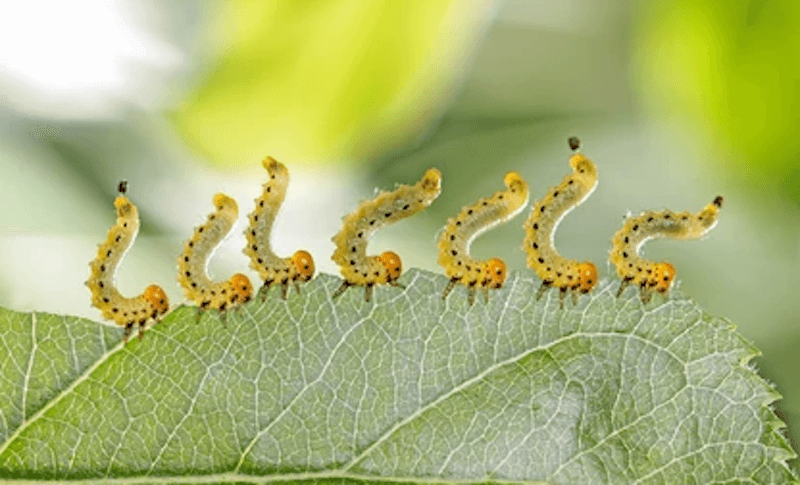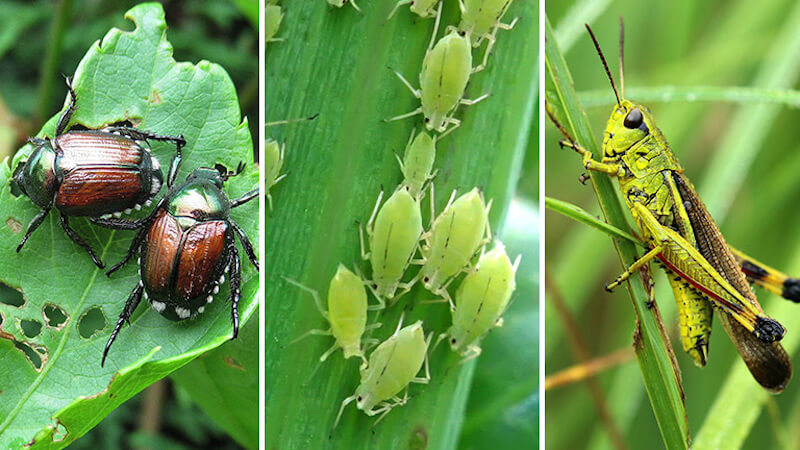
Farms and gardens are often targets of a variety of pests that can cause significant damage to crops. In this article, common farm and garden pests are identified including the plants they target, and the damage they cause. We will also explore natural and chemical treatments for each pest, so you can effectively protect your crops.
Leaf beetles are diminutive insects that consume the foliage of various agricultural and garden plants, encompassing beans, tomatoes, and potatoes. They can cause significant damage by chewing holes in leaves, which can lead to reduced growth and yield. One natural treatment for leaf beetles is to handpick them off the plants and drop them into a bucket of soapy water. You can also use a neem oil spray, which is a natural insecticide that repels leaf beetles.
Green shield bugs, also commonly known as stink bugs, are a widespread nuisance in agricultural and horticultural settings. They sustain themselves by extracting sap from a variety of plants, not limited to, but encompassing tomatoes, peppers, and beans. They can cause wilting and stunted growth, and their feeding can also make the fruits of some plants become discolored or deformed. One natural way to control green shield bugs is to use a mixture of soap and water to spray the plants. You can also introduce natural predators such as birds, lacewings, and ladybugs.
Green shield bugs, also commonly known as stink bugs, are a widespread nuisance in agricultural and horticultural settings. They sustain themselves by extracting sap from a variety of plants, not limited to, but encompassing tomatoes, peppers, and beans. They can cause wilting and stunted growth, and their feeding can also make the fruits of some plants become discolored or deformed. One natural way to control green shield bugs is to use a mixture of soap and water to spray the plants. You can also introduce natural predators such as birds, lacewings, and ladybugs.
Green shield bugs, also commonly known as stink bugs, are a widespread nuisance in agricultural and horticultural settings. They sustain themselves by extracting sap from a variety of plants, not limited to, but encompassing tomatoes, peppers, and beans. They can cause wilting and stunted growth, and their feeding can also make the fruits of some plants become discolored or deformed. One natural way to control green shield bugs is to use a mixture of soap and water to spray the plants. You can also introduce natural predators such as birds, lacewings, and ladybugs.

Weevils are small beetles that can cause damage to many farm and garden plants, including strawberries, beans, and corn. Feasting on leaves, stems, and roots, they have the potential to inflict considerable harm to crop yields. One natural way to control weevils is to handpick them off the plants and drop them into a bucket of soapy water. You can also use a natural insecticide such as spinosad.
Cabbage white butterflies are a common farm and garden pest that lays its eggs on cabbage, broccoli, and other members of the brassica family. The hatchlings that emerge from these eggs can inflict substantial harm on the plant leaves, resulting in stunted growth and diminished crop yield. One way to control cabbage white butterflies is to use a physical barrier, such as netting, around the plants. Natural insecticides, like Bacillus can also be used to prevent damage to cabbage plants.
Cabbage white butterflies are a common farm and garden pest that lays its eggs on cabbage, broccoli, and other members of the brassica family. The hatchlings that emerge from these eggs can inflict substantial harm on the plant leaves, resulting in stunted growth and diminished crop yield. One way to control cabbage white butterflies is to use a physical barrier, such as netting, around the plants. Natural insecticides, like Bacillus can also be used to prevent damage to cabbage plants.
Pigeons, rabbits, and deer are typical nuisances in farms and gardens, all capable of causing substantial harm to crop yields. Pigeons can eat young seedlings and tender shoots, while rabbits can chew through bark and eat foliage. Deer can cause significant damage to crops by browsing on leaves and stems.
One method of managing these pests involves implementing physical defenses, like netting, around the plants or garden plots. You can also use natural repellents like garlic or hot pepper sprays to deter these pests. Alternatively, you could incorporate natural adversaries like owls or hawks into your farm or garden as a means of helping to keep these pests in check.

Slugs are common farm and garden pests that can cause significant damage to young seedlings and tender plants. They can chew through leaves and stems, and their slime trails can also attract other pests. One natural way to control slugs is to use copper tape around the perimeter of garden beds or planters. You can also use natural remedies like beer traps or diatomaceous earth.
Slugs are common farm and garden pests that can cause significant damage to young seedlings and tender plants. They can chew through leaves and stems, and their slime trails can also attract other pests. One natural way to control slugs is to use copper tape around the perimeter of garden beds or planters. You can also use natural remedies like beer traps or diatomaceous earth.
Leafhoppers are small, winged insects that can cause significant damage to crops by feeding on the sap of plants. They can cause leaves to curl, wilt, and turn yellow, which can lead to reduced growth and yield. One natural way to control leafhoppers is to introduce natural predators like spiders or lacewings to your farm or garden. You can also use natural insecticides like neem oil or insecticidal soap.
Potato bugs, also known as Colorado potato beetles, are a common pest of potato plants. They can cause significant damage to the leaves and stems of potato plants, leading to reduced yield. A natural method to manage potato bugs involves manually removing them from the plants and depositing them into a container filled with soapy water. You can also use natural insecticides like spinosad.
Cutworms, notorious pests, can inflict serious harm to numerous crops, inclusive of both vegetables and fruits. They can cut off the stems of young plants, leading to reduced growth and yield. One natural way to control cutworms is to introduce natural predators like birds or ground beetles to your farm or garden.
Cutworms, notorious pests, can inflict serious harm to numerous crops, inclusive of both vegetables and fruits. They can cut off the stems of young plants, leading to reduced growth and yield. One natural way to control cutworms is to introduce natural predators like birds or ground beetles to your farm or garden.
Here are some excellent natural remedies for garden pests:
Pests in farms and gardens pose a substantial challenge to farmers and gardeners alike, inflicting damage to crops and diminishing harvest outputs. However, there are many natural and chemical treatments available to control these pests effectively. By investing time in comprehending the pests prevalent in your farm or garden and implementing suitable remedies, you can safeguard your crops and relish a plentiful yield.
Ready to transform your land into a high-yield, sustainable farm? Let Crop Circle Farms design and build a custom, low-impact, and water-efficient farm tailored to your needs. Double your income and cut your costs in half! Contact Us
Help us expand our mission to revolutionize agriculture globally. We are seeking partners to implement Crop Circle Farms to feed people in need. Together, we can build scalable food production systems that save water, reduce costs, and feed thousands of people. Contact Growing To Give